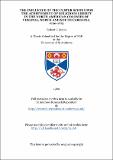Files in this item
The influence of the Ulster Scots upon the achievement of religious liberty in the North American colonies of Virginia, North and South Carolina, 1720-1775
Item metadata
| dc.contributor.author | Jones, Robert L. | |
| dc.coverage.spatial | viii, 363 p. | en_US |
| dc.date.accessioned | 2018-06-22T13:47:14Z | |
| dc.date.available | 2018-06-22T13:47:14Z | |
| dc.date.issued | 1960 | |
| dc.identifier.uri | https://hdl.handle.net/10023/14468 | |
| dc.description.abstract | When the federation of the thirteen English colonies into the United States of America was finally achieved in 1776, powerful influences had made it certain that this new nation would have religious freedom and that it would not maintain an established church. Among those influences was the influence of an overwhelming number of settlers known as Ulster Scots, or Scotch-Irish, who emigrated into the colonies from Northern Ireland between the years 1720 and 1775. They came as dissenters from the Established Church in northern Ireland and remained dissenters from the Established Church as they found it where they settled along the frontiers of the Southern Colonies of Virginia, North and South Carolina. From 1720, the year these Ulstermen emigrated to the colonies in any appreciable numbers, until 1775 at the outbreak of hostilities between the colonies and England, they exerted a significant influence upon the achievement of religious liberty. Although the Ulster Scots were the most widely distributed of immigrants except those from England, being found in all thirteen colonies at the time of the Revolution, their influence in achieving religious freedom was most effective in the Southern Colonies where their numbers were most effective in the Southern Colonies where their numbers were five times as large as in the north. The development of religious liberty in colonial America has been determined to have had its impetus in three factors. First, the large and influential number of sects in the colonies; second, the liberal philosophy of sects in the colonies; second, the liberal philosophy of the 18th century with its relationalistic temper coupled with a fervent evangelical zeal that is reflected in the revivalistic movement of the Great Awakening across the middle of the 18th century; and thirdly, the ecclesiastical and political influence and interference of England. The Ulster Scots were directly concerned with the first and second factors. The third factor, however, does not relate itself to them primarily because they were situated on the western frontier of the Southern Colonies and not directly connected with any major commercial interests which developed such a display of emotion as was to be found in such centers of commerce as Boston and Philadelphia. The effort on the part of some colonials to prevent the appointment of a resident Bishop of the Anglican Church in the colonies does not appear to have made much impression on the Ulster Scots in the Southern Colonies, as the opponents to such a move were confined principally to the New England and to a lesser extent in the Middle Colonies. Opposition in the Southern Colonies to the appointment of a resident Bishop was found among the Anglican planters who had, for all intents and purposes, control of the Establishment through the vestries and did not wish to lose it. Because the Ulster Scots were the largest group among the sects dissenting from the Establishment who settled in the Southern Colonies their influence was proportionately greater in the achievement of religious liberty in these colonies than any other. But equal in importance with their numerical strength was the site of their settlements in the Southern Colonies. Prevented largely from setting in the more well-established tidewater area of the colonies of Virginia and South Carolina, they were forced to push westward into what was called the back country, or the frontier settlements were initiated by the emigration of these Ulster Scots from the colony of Pennsylvania who came down the eastern and western valleys of the mountain range which extends across the western flank of the Southern Colonies. There, in the isolation of the wilderness, their influence for the achievement of religious liberty exerted itself along with other dessenters from the Establishment so as to hasten the disestablishment of the Anglican church in the Southern colonies at the outbreak of the revolution, and usher in religious liberty. | en_US |
| dc.language.iso | en | en_US |
| dc.publisher | University of St Andrews | |
| dc.subject.lcc | F212.J7 | en |
| dc.subject.lcsh | Southern States--History--Colonial period, ca. 1600-1775 | en |
| dc.subject.lcsh | Ulster (Northern Ireland and Ireland)--History--18th century | en |
| dc.title | The influence of the Ulster Scots upon the achievement of religious liberty in the North American colonies of Virginia, North and South Carolina, 1720-1775 | en_US |
| dc.type | Thesis | en_US |
| dc.type.qualificationlevel | Doctoral | en_US |
| dc.type.qualificationname | PhD Doctor of Philosophy | en_US |
| dc.publisher.institution | The University of St Andrews | en_US |
This item appears in the following Collection(s)
Items in the St Andrews Research Repository are protected by copyright, with all rights reserved, unless otherwise indicated.

